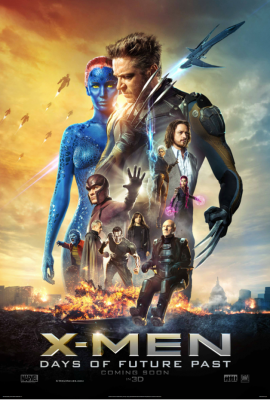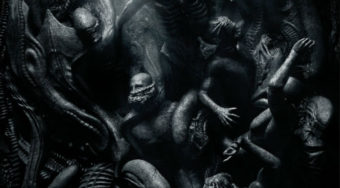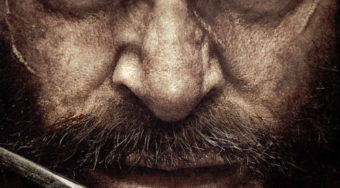Film Reviews

X-Men: Days of Future Past
Genre: Action and Adventure
Director: Bryan Singer
Cast: Hugh Jackman, James McAvoy, Michael Fassbender, Jennifer Lawrence, Halle Berry, Anna Paquin, Ellen Page, Peter Dinklage, Patrick Stewart, Ian McKellen
MPAA-Rating: PG-13
Release Date: May 23rd, 2014
On the television drama Game of Thrones, cheap Peter Dinklage plays Tyrion Lannister, viagra 40mg a physically-powerless character consistently undermined by his powerful family. Tyrion often lacks the power to defend himself from the external forces that seek to destroy him. In X-Men Days of Future Past, Dinklage’s character attempts to win the upper hand that Tyrion usually lacks.
His politically-driven character here–the menacing Dr. Bolivar Trask– is a great departure from Tyrion. Trask often feels defenseless but instead of relying on the support of others to survive (as Tyrion does), he decides to destroy the enemy that scares him most– the burgeoning mutant community.
As X-Men opens in the present day, the machines that Trask once dreamed of have been brought to life and are mutilating the entire mutant population. These machines— known as Sentinels— can replicate mutant powers and use such abilities to destroy the mutant characters. The murder of hundreds of innocent mutants has led to an unholy alliance between Professor X (Patrick Stewart) and Magneto (Ian McKellan), two characters whose animosity towards one another often led the events of the original X-Men film trilogy (2000-2006).
In 2011, X-Men: First Class dared to reboot the X-Men series, offering it a fresh start from that trilogy. In that feature, the franchise dared to present Charles Xaviar and Erik Lehnsherr (the characters who eventually transformed into Professor X and Magneto) as allies who were growing accustomed to their new powers. Played by James McAvoy and Michael Fassbender, the characters were reborn as young men who were forced to decide their destinies during the early 1960s (one chose to become a peacekeeper while the other chose the path of war).
Here, this sequel dares to challenge many more of its characters, who are given the choice to decide their futures in the early 1970s as Trask’s plans for the Sentinels are taking shape. With Sentinels killing mutants in the present day, Wolverine (Hugh Jackman) is forced to go back into the 70s to shape a new reality of the present. By doing so, the film offers new choices for many of the main characters we’ve grown to love– breaking up old alliances and forging new relationships that will be reshaped by the time travel.
The film dares you to accept that through the events of the time jump, the X-Men aren’t what they once were and have been forever changed.
X-Men: First Class may have served as a reboot of the franchise but this sequel serves as its reawakening— making dramatic choices and leaps that other such franchises would be hesitant to. Some viewers will likely feel disturbed that much of the story’s mythology dramatically changes what came before; others will likely feel refreshed that in this age of sequels that offer “more of the same” (if a formula works, keep it going!), this movie stands against the tide stating explicitly “We dare you to think differently.”
Director Bryan Singer, who helmed X-Men (2000) and X-Men 2 (2003), seems intent on embracing a new story for these characters and does it with style. Like the old and new casts coming together in Star Trek Generations (1994)–which also featured Mr. Stewart–Singer brings together two generations of the X-Men series here, featuring cast members of the original trilogy (Stewart, McKellan and Halle Berry etc.) alongside members of this First Class (McAvoy, Fassbender, and Jennifer Lawrence etc.). It even features a standout performance from Evan Peters, who plays the quirkly and charismatic Quicksilver, a new character who arrives onscreen only to steal scenes from many of the better-known characters nearby.
Adapted from the comic of the same name, Days of Future Past also features— more cohesively than before— the timely themes of acceptance and openmindedness that have permeated the franchise. The mutants are living in a world that often misunderstands and underappreciates them and while the pacifists believe that an alliance with the humans will better the world, the dissenters (like Magneto, a Holocaust survivor) believe that war is inevitable. As usual, Dinglage brings depth to his character who is not written as a typical villain. He’s a man who simply believes that the mutants are a threat to mankind and must be eliminated and some of his concerns– see the history that is trying to be corrected here– are absolutely valid.
As with its predecessor, this drama meticulously blends historical milestones with an alternate mutant timeline of events. When Wolverine for one travels back into the past, Magneto is imprisoned for the assassination of President John F. Kennedy (and much of that back story works perfectly in explaining the “Magic Bullet” theory of that tragic event). Never relying on clichés and its characters simply going through the motions, X:Men serves as a refresher course of what summer movies can do.
They can offer audiences a chance to see an expected amount of exciting action sequences and beloved characters reunited on the big screen. But they can also dare to be more.
X-Men: Days of Future Past dares to be more.
Review by: John Hanlon












